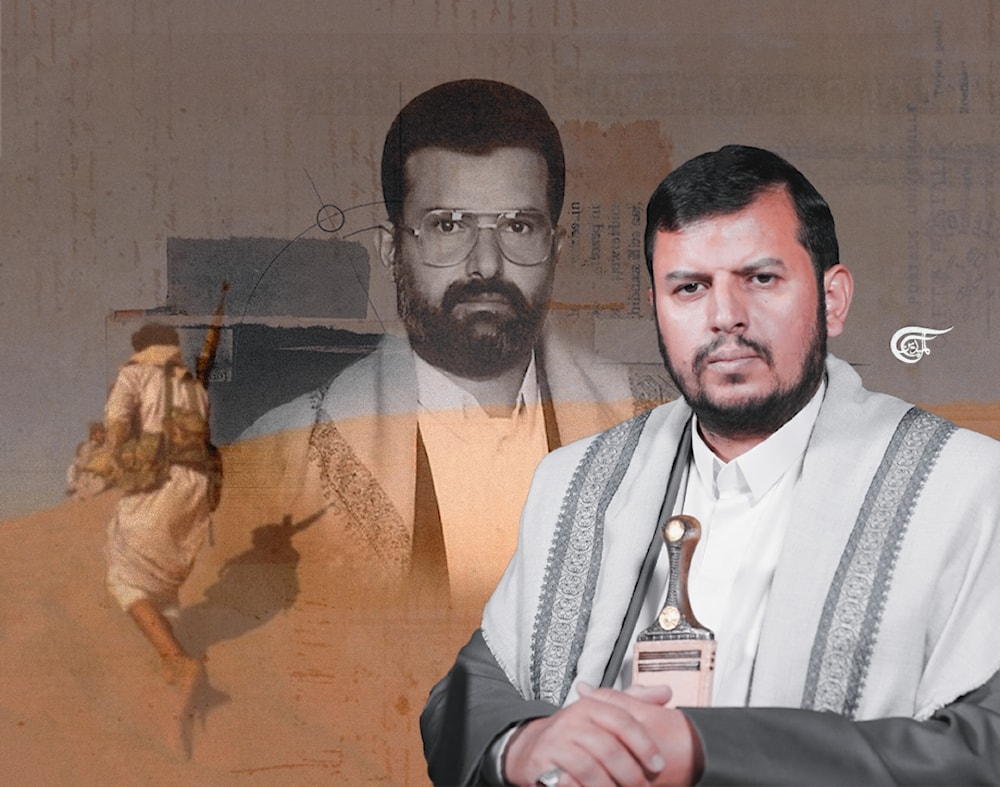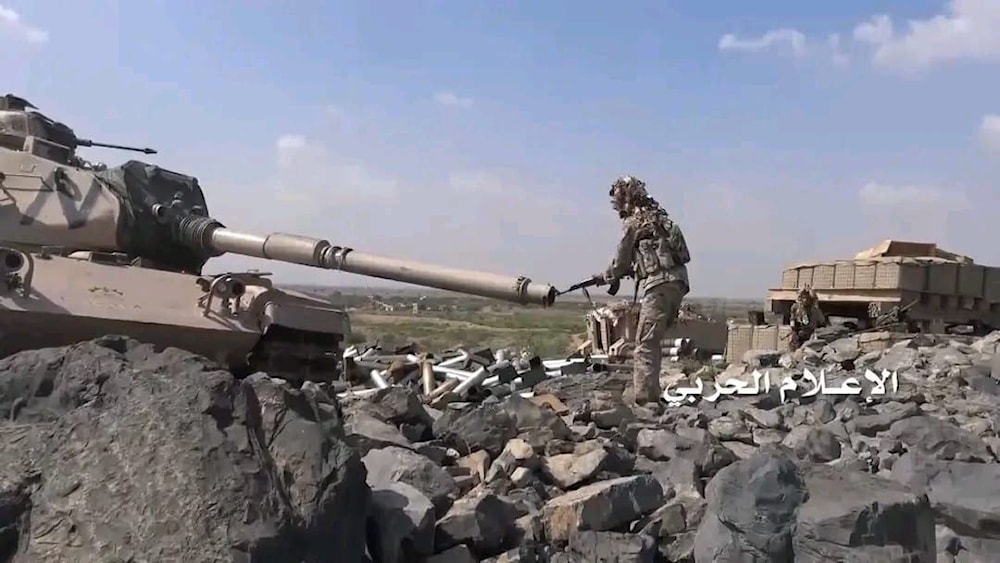What the West needs to know about Yemen's Ansar Allah
The West's failure to recognize Ansar Allah as a revolutionary movement may escalate the risk of a full-blown war, with the West paying a high price, ultimately leading to its defeat in West Asia.
-

Sayyed Hussein Badr al-Din al-Houthi planted the foundations for the Ansar Allah movement in Yemen in 2004. (Al Mayadeen English; Illustrated by Arwa Makki)
The Ansar Allah movement has lately attracted international attention by boldly defying major world powers, particularly the United States, through their military actions to support Palestine amid the ongoing Israeli genocide in Gaza.
This decision comes at a time when even larger Arab nations refrain from such interventions, despite Yemen itself enduring a decade of US-backed Saudi-led aggression and grappling with a severe humanitarian crisis due to a yearslong land, sea, and air blockade. In an attempt to thwart Yemen's efforts and hinder Sanaa from enforcing its solidarity with Gaza, Washington and the UK launched a series of attacks on the country in recent weeks, with a plethora of media outlets shining their spotlights on the Ansar Allah, whom they call "Houthis", hosting Orientalist pundits attempting to 'crack their puzzle'.
The US, UK, and "Israel" persistently describe Ansar Allah as an Iranian proxy, disregarding the movement's autonomy and independence. This misunderstanding of this revolutionary movement may escalate the risk of a full-blown war in the region, with the West paying a high price, ultimately leading to its defeat in West Asia.
So who are the Ansar Allah exactly, and what are they fighting for?
Who are the 'Houthis'?
The term "Houthis" refers to an indigenous tribal group in Yemen that originates from the Arab Hamdani tribe residing in northern Yemen, and is a subdivision of the larger Banu Hamdan tribe. Their main settlements are concentrated in the regions of 'Amran and Saada.
Since the early 2000s, and after the group began explicitly voicing its anti-imperialist ideology, Western countries and think tanks, trying to demoralize them and alienate them from their population, labeled them as "Iranian proxies" and "terrorists" who should be eradicated.
However, it is essential to recognize that the "Houthis" trace their roots back to the eighth century to the arrival of Zayd ibn Ali ibn Hussein in Yemen.
Zayd ibn Ali (695–740) was the son of Ali ibn al-Hussain Zain al-Abidin and the grandson of Imam Hussain ibn Ali ibn Abi Talib. He initiated a revolution against the Umayyad caliphate, leading to his martyrdom. Zayd ibn Ali's revolution was meant to oppose injustice like his grandfather Imam Hussein, who was martyred at Karbala in southern Iraq on 10 Muharram 61 AH (680 CE) by the army of Yazid Ibn Muawiya, the Umayyad ruler at the time.
Zayd ibn Ali is recognized as a significant religious figure not only among Shia Muslims but also by many Sunnis. Notably, Sunni jurist Abu Hanifa issued a fatwa supporting Zayd against the Umayyads. Zayd remains a pivotal revolutionary figure, with many Yemenis eventually becoming Zaydis (believing that Zayd is the true imam after Hussein ibn Ali) and is universally regarded as a martyr by both Sunni and Shia traditions, one who planted the seeds of resisting oppression and of solidarity with the oppressed.
Over the years, the "Houthis" developed their own historical narrative and political movement known as Ansar Allah, which would grow to surpass the "Houthi" element. Labeling all members of the tribal confederacy in northern Yemen as "terrorists" or "Houthis" and advocating for their indiscriminate elimination overlooks the complexity of their history and political formation.
Contemporary history
-

Sayyed Hussein Al-Houthi, the founder of the Ansar Allah
Sayyed Hussein Badr al-Din al-Houthi laid the foundation for the Ansar Allah movement in Yemen in 2004. During that period, Sayyed al-Houthi described the early members of the Ansar Allah movement, before it adopted this name, as a community of believers guided by the principles of the Holy Quran. He refrained from associating the movement with specific sectarian labels, underscoring its Islamic affiliation and Quranic identity as inclusive principles capable of encompassing all Muslims.
The Ansar Allah movement stood out in its political aspect by advocating opposition to American and Israeli meddling in West Asia, especially in Yemen.
"Sayyed Hussein Badr al-Din al-Houthi, in several lessons given under the title 'Lessons from the Guidance of the Holy Qur’an,' emphasized the US' active posturing against our nation", Yemeni diplomat Yasser Mohesn Almohallil told Al Mayadeen English.
"Ansar Allah faced persistent harassment from the authorities during the rule of Ali Abdullah Saleh. The regime made multiple attempts to pressure Sayyed Hussein Al-Houthi into changing his well-known slogan."
"Despite these efforts, when the authorities failed to deter him, they declared war against Sayyed Hussein and his supporters. The initial confrontation occurred in the Maran area in northern Saada after he [Saleh] returned from Washington with a shipment of weapons and U.S. trainers," he further affirmed.
After Sayyed Hussein's martyrdom, the leadership was transferred to his father and then to his brother Sayyed Abdul-Malik al-Houthi, the current leader of Ansar Allah.
How Ansar Allah evolved into a formidable US foe
Ansar Allah, originating from Quranic principles laid down in 2001 by Sayyed Hussein, faced six wars initiated by Ali Abdallah Saleh's authority, with the sixth involving Saudi Arabia. At that time, Ansar Allah had limited resources, armed only with AK rifles, while the government possessed advanced weaponry, most notably F-16 aircraft, tanks, artillery, and anti-aircraft weapons, Ansar Allah Resistance fighter Hammam Hassan said in an exclusive interview with Al Mayadeen English.
"The war's cause was attributed to Ansar Allah's 'Death to America, Death to Israel' slogan, and tensions escalated after a visit by Abdul-Malik to Saada, prompting Saleh's declaration of war," he further added.
He went on to say that Ansar Allah, initially armed with simple capabilities, progressed from manufacturing primitive bombs in juice boxes to homemade landmines, later developing missiles like Zelzal and al-Sarkha, as per Hassan.
During the war with Saleh, Ansar Allah acquired and developed weapons to serve Yemen and other free Arab nations, he said.
Regular Yemeni fighters
Regarding the weaponry possessed by the regular Yemeni Resistance fighters, Ansar Allah Resistance fighter Hammam Hassan detailed to Al Mayadeen English that the fighters are armed, first and foremost, with their strong faith in God and a commitment to the cause they are fighting for.
"I have deduced a principle from the wars in Yemen, including the war on Gaza, and that is that when two armies meet – one with powerful weapons and another with weaker weapons – the one who will win the battle is the one with a strong cause, even if their equipment is inferior," he said proudly.
Regular Yemeni fighters have access to widely available weapons, such as the Kalashnikov rifle and machine guns, including anti-aircraft guns. However, these weapons need to be well-maintained as they are old, he explained.
He further stressed that a regular fighter typically carries a simple machine gun, RPG launcher, or Kalashnikov, but because they are guided by principles and a strong belief, God grants them victory.
"You've witnessed the Yemeni fighter who, barefoot, climbed an Abrams tank – a U.S. industry icon – fearlessly captured it, and then set it ablaze with firewood back in 2016. You might wonder how such an event could unfold. It's because the Yemeni fighter is driven by a cause, a principle, strong beliefs, and unwavering conviction, while the enemy lacks any equivalent," he recalled.
Saudi M1A2 Abrams tank captured and detonated by #Yemen's Houthi fighters in Al-Khubah, Jizan, southern #Saudi. pic.twitter.com/QG2qQwylju
— H. Sumeri (@IraqiSecurity) February 14, 2016
Regarding the Americans' ability to respond to Yemen's attacks, he sarcastically remarked, "Let them respond. The fighters of Ansar Allah have over twenty-three years of experience and embody principles, strength, and determination. They excel in camouflaging and concealing weapons in warehouses unknown to anyone; even the fighter storing the weapons is unaware of the precise location or the name of that area. We maintain a high level of secrecy and confidentiality in such matters."
Ground and air military capabilities
As for the ground and air military capabilities, many advanced weapons have been revealed by the Ansar Allah, particularly on the anniversary of the September 21 Revolution in 2021 and 2023.
Regarding naval weapons, locally manufactured weapons include remotely operated explosive-laden boats (Unmanned Surface Vehicles) and lethal naval mines. These weapons have been also publicly revealed. However, Ansar Allah also owns undisclosed weapons and missiles that could be deployed from vessels or the coast, Hassan divulged to Al Mayadeen English.
"Each party in the war holds cards that should not be revealed until the right moment. We could have closed the Bab al-Mandab Strait in 2017-2018 when we were besieged by countries worldwide, but with God's grace and the wisdom of our leader, the decision to close the Red Sea passage was not taken. If we had utilized the Red Sea option, we wouldn't have had the current capability to launch even a single shot to support Gaza," he noted.
In the same context, Almohallil contended that Western media is trying to portray a balance in capabilities between Ansar Allah and the United States. Despite the US possessing superior capabilities, effectively countering Yemen's tactics requires a precise military approach, an area where Washington has so far been unsuccessful, as per Almohallil.
The confrontation over the past nine years of aggression has yielded substantial benefits, he noted.
"The United States' becoming deeply involved in the coalition led by Saudi Arabia offered valuable field experience to Ansar Allah. This experience involved dealing with an extensive, aggressive war where coalition forces utilized a range of advanced American weapons. Ansar Allah also gained insight into the strategy behind the aggression devised by Washington, allowing them to adapt their operations accordingly. This adaptation, in turn, led to a refinement in the course of operations based on an understanding of the tactics employed by the aggressors," he added.
'The land fights with us'
The Yemeni terrain poses a formidable challenge for any invader, as it is widely known to be one of the most rugged and demanding landscapes on the planet. The topography of Yemen is characterized by steep mountains, deep valleys, and arid plateaus, creating a complex and difficult environment to navigate. The terrain's rough nature not only complicates military operations but also hinders infrastructure development, making it a significant factor that shapes the strategic considerations of any foreign force operating in the region.
The Yemeni mountains present extreme challenges, making it difficult for US missiles or drones to reach their peaks, rendering such attempts futile, as per Hassan.
During the Saudi-led aggression, Yemen was closely monitored by satellites and spy drones, to the extent that if there were a stone in a certain area, a drone would come, capture an image of the stone, and if the stone moved, the drone would strike the location, he said.
"This illustrates the extent of aerial surveillance in Yemen. However, we successfully concealed weapons, tanks, and aircraft. We developed long-range missiles with a reach of up to 200, 300, 500, 700 kilometers, and even a thousand kilometers. We manufactured, stored, and launched these missiles—all by the grace of God and the skills of Yemeni resistance fighters, who possess high capabilities in concealing and camouflaging. The Americans cannot reach [find] us," he further emphasized.
The US VS Ansar Allah
In response to Ansar Allah's operations in the Red Sea and the Gulf of Aden in support of Gaza, the United States pursued a dual strategy. Initially, the US attempted to entice the movement with financial incentives. However, when this approach proved unsuccessful, the United States opted for a more forceful response, resorting to bombing Yemen.
On this issue, a member of the Ansar Allah political bureau, Mohammad Alfareh, described the American-British aggression on Yemen as "a blatant and unjustified act that lacks legitimacy."
He further told Al Mayadeen English that the aggression is taking place within the framework of the protection provided by the United States and Britain to the Israeli enemy, allowing it to continue its killings, atrocities, and brutal massacres in Gaza.
"In this regard, we urge all media outlets and activists on social media not to align with the American narrative, which portrays this aggression as self-defense and protection of global navigation, falsely claiming that it is a response to the killing of their soldiers. The reality is that America is an aggressor and an occupier that came from across the oceans to dominate, plunder, and destroy. The war has been ongoing since 2001 and did not start with the killing of their three soldiers," he clarified.
Alfareh reaffirmed that Yemen's stance towards Gaza remains unwavering, regardless of challenges and threats.
"We consider it a humane and ethical position, seeking to achieve peace in Palestine and security in our Arab region and the world," he said.
We also assert that our people have every right to confront the American and British aggression that violates our sovereignty and independence. It is a foreign intrusion in our region. The Muslim nations have the right to support Gaza, which is witnessing the greatest massacre committed by the Zionists with American, British, and Western support, he further added.
The official questioned, "Why does the US grant itself the right to commit crimes and aggression, supporting the Israeli enemy, and then deny our right to stand by our oppressed brothers, who are championing a just cause connected to us by religion, blood, language, culture, and nationality, more than what connects the American to the Zionist?"
On the US' attempt to lure Ansar Allah, Ansar Allah Resistance fighter Hammam Hassan divulged to Al Mayadeen English that the movement had the option to remain silent about what is happening in Gaza, as it was promised that employees would receive salaries that had been confiscated in the years past by the coalition. Salaries have been cut for ten years now, and Yemeni citizens struggle to make ends meet. However, even the simplest Yemeni citizens, including those opposing Ansar Allah, if asked whether they'd prefer to receive ten-years' worth of salaries in exchange for the movement's silence on the genocide in Gaza, or participate in a demonstration condemning the genocide, they would say they do not want salaries, he further stressed.
"Let me die of hunger; I would rather not stay silent about injustice. This would be the answer. This is the Yemeni people—a proud, stubborn people," he affirmed.
"By Allah, even if our bodies are scattered in the air, we would not abandon Palestine and Gaza."
Hassan went on to say that Yemen has nothing to lose, as essential infrastructure like schools and hospitals has been decimated due to the Saudi-led aggression. He asserts that the only thing Yemenis have in their possession amid all this destruction is their dignity.
In response to US strikes, Hassan reiterated that Ansar Allah is ready to face the United States directly, expressing weariness from engaging with the US' proxies since 2002, accusing Ali Abdullah Saleh and Saudi Arabia of being American puppets.
Ansar Allah underscores its resistance as a matter of pride and honor, confidently stating that the US will not be able to harm them, he said.
As for the US' ability to achieve its objective to stop Ansar Allah's operations, Yemeni Diplomat Yasser Mohesn Almohallil commented by saying, "Drawing from this experience and considering the substantial popular support that has become a significant factor in the struggle, the United States currently seems to be struggling to develop new strategies to handle a resilient and self-directed uprising force."
This force has proven its ability to stay steadfast, shift the balance of the battle in its favor, and adapt military tactics to achieve its goals, he further added.
"The US has found, among its diverse military options, only futile attempts in imitating the tactics utilized by Ansar Allah. These attempts appear to be aimed at creating a perception of parity to restore its strategic equilibrium," Almohallil concluded by saying.
In short, the strength and endurance of Ansar Allah as a unified movement from its entrenched ideological principles and strategic goals adheres to an anti-imperialist and anti-Zionist agenda, centering around the Palestinian cause. Presently, the Resistance movement is united in its pursuit of two main objectives: compelling "Israel" to agree to an unconditional ceasefire in Gaza, and ending the blockade on Gaza.
In the pursuit of these goals, Ansar Allah operates based on its own political convictions and strategic interests, rather than adhering to external directives. This autonomy is a key factor in why Yemen is renowned as the graveyard of its invaders.
Read more: US-UK aggression against Yemen is an open war: Ansar Allah

 15 Min Read
15 Min Read









